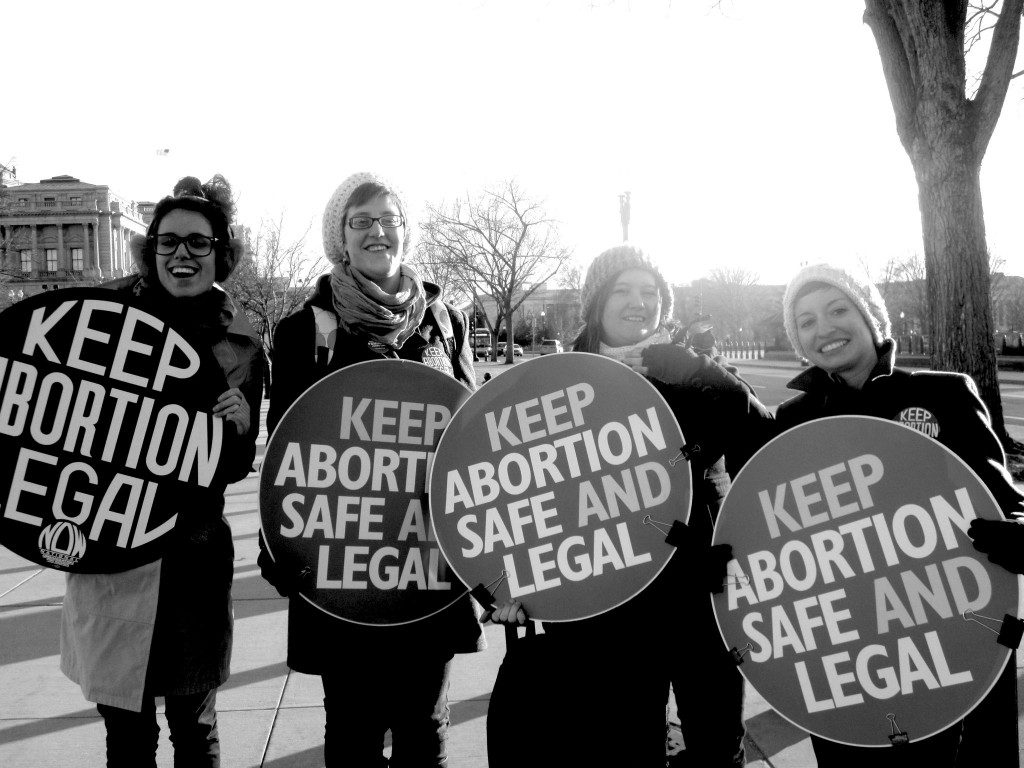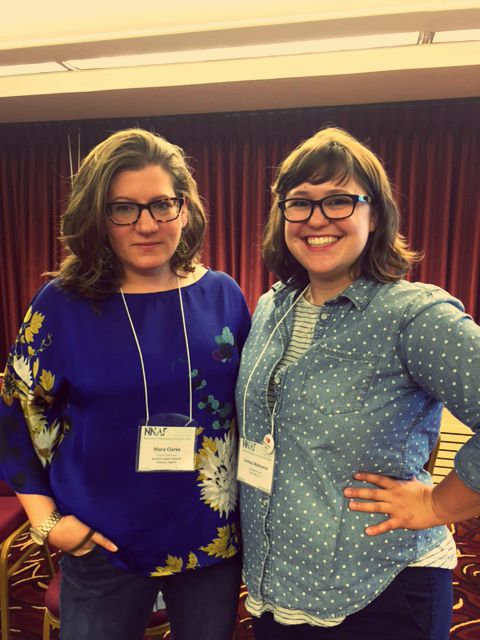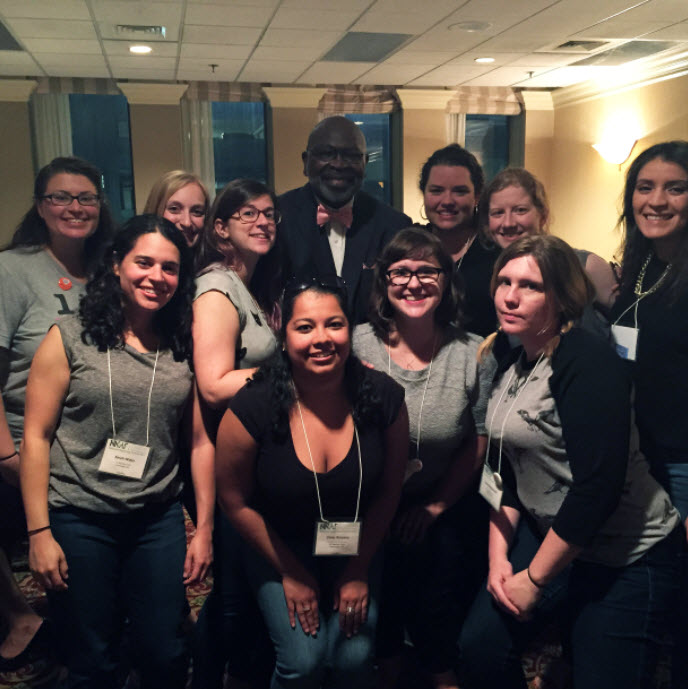
Image Credit: Feminist Campus via Think Progress
FOR A WOMAN LIVING IN THE UNITED STATES, deciding to get an abortion in the face of an unwanted pregnancy can be one of the most difficult decisions she can make in her lifetime. Actually getting the abortion, though, can be very easy — as routine as setting up an appointment with her doctor for a yearly physical, even. Assuming she’s lucky, that is.
Lucky meaning she’s financially independent, educated about her body and her choices, able to speak English fluently and understand when it’s spoken back to her, and living in a state that doesn’t place bureaucratic roadblocks in her way at every turn. For the hundreds of thousands of women each year who didn’t win the lottery of life circumstances but still make the decision to terminate their pregnancies, getting access to the medical care necessary for a legal abortion is extremely difficult. If it weren’t for organizations like the DC Abortion Fund, it would probably be impossible.
An all-volunteer, non-profit organization based in the Washington metropolitan area, the DC Abortion Fund (DCAF) has one mission at its heart: providing financial assistance to anyone in DC, Maryland, and Virginia who is pregnant and cannot afford the full cost of an abortion — be they cis, trans, or intersex. Through DC Abortion Fund’s aid, the gap between what the abortions cost and what people can afford to pay can be bridged. In 2014 alone, DC Abortion Fund pledged $198,889, helping 950 pregnant patients get the abortions that they would have been unable to receive otherwise. DC Abortion Fund’s assistance comes with zero strings attached, as a free and confidential helpline that expects no repayment for the assistance it provides.

Lindsay (r), one of DC Abortion Fund’s case managers, with another attendee at this year’s National Network of Abortion Funds’ summit.
There are numerous studies that show abortion is an experience that isn’t limited to one specific racial or class demographic. According to statistics compiled by the Guttmacher Institute, one in three American women will have had an abortion by the time she reaches 45. These studies also point to economic disadvantage as one of the most pressing obstacles that women seeking abortions have to contend with. “People who call the DC Abortion Fund are frequently in one of the most vulnerable positions in their lives: they are calling strangers to ask for money to get one of the most stigmatized health care services in the United States,” says Paulina Montañez-Montes, a volunteer case manager working with DC Abortion Fund. Besides the deep need for financial assistance that callers often experience, there are other contributing factors to take into consideration, like finding transportation to and from clinics and securing lodging once they arrive. For callers who don’t speak English fluently, planning out the logistics can be especially daunting. “The Latino/Hispanic population which contacts us also must overcome language barriers on top of other obstacles,” continues Ms. Montañez-Montes. Thanks to her help and the help of other case managers who speak Spanish, the fact they don’t speak English doesn’t automatically mean that women seeking abortions will be prevented from receiving the information and support they need to make informed decisions.
While the work that DC Abortion Fund does is absolutely necessary, women wouldn’t so desperately need the services it provides if abortion wasn’t the highly-stigmatized and inaccessible procedure it continues to be in this country, despite the many years that have passed since the landmark decision of Roe v. Wade that assured women the right to an abortion. In the region where DC Abortion Fund operates, restrictive laws like mandated in-person counseling followed by mandatory waiting periods are in place, ostensibly to make women think twice about having the procedure. Virginia, specifically, has enacted Targeted Regulation of Abortion Providers, or TRAP, laws, which do not prevent women from getting abortions outright but accomplish the same goal by requiring that abortion providers meet certain requirements in order to continue providing abortions. These can include doctors being required to obtain admitting privileges at nearby hospitals or abortion clinics being required to meet the building codes of ambulatory surgical centers.
On a national level, the Hyde Amendment prevents the use of federal funds to pay for abortions except in the cases of rape, incest, or the likely death of the mother. That means low-income women who use Medicaid as their primary source of health care – women at a severe economic disadvantage who find it more difficult to bear the financial brunt of paying for any medical procedure – are barred from using Medicaid to pay for their abortions. Oftentimes, that’s the only kind of health insurance these women will have access to. Even DC Abortion Fund, which tries to correct these institutional imbalances, isn’t exempt from their influences; its own budget is subject to congressional approval, which means that much of its ability to assist the women who turn to it for services hinges directly on Congress’ attitude towards abortion.
This makes it vital, then, that the public makes it support vocal for DC Abortion Fund and other organizations that provide similar services. DC Abortion Fund is able to do the work it does, in large part, because of the donations made to it by its supporters. Donors know that their money is being used to directly help DC Abortion Fund’s callers get the medical care they need, and that their dollars count. But perhaps what counts even more than financial support is making a commitment to playing a part in changing the negative culture currently surrounding abortion. DC Abortion Fund already has its plate full doing all it can to help those in need and provide its callers with funds for abortion care. It’s a cliché, but it really is up to people who care about protecting women’s access to abortion to engage in the advocacy so desperately needed to destigmatize the issue and change policymakers’ positions on it. The first step to destigmatizing abortion is being more willing to talk about it, and to listen to others talk about it. “Let others know about our work. Especially if you are in the DC area, talk to friends and family about us. Additionally, share stories of the current abortion care climate with others. Despite abortion being a common and safe procedure, many don’t know how hard it is to actually get one, especially if you are low-income and live in a hostile state,” says Ms. Montañez-Montes when I ask her how people who want to support a woman’s right to choose can help organizations like DC Abortion Fund.

DC Abortion Fund case managers with Dr. Willie Parker, one of two providers at the only abortion clinic in Mississippi, the Jackson Women’s Health Organization
While deciding to have an abortion can be one of the toughest decisions a woman will make, it can just as easily be a simple one. Whatever pros and cons she weighs, whatever factors she takes into consideration, the ability or inability to pay for the procedure shouldn’t have to figure into the equation. Her proximity to the nearest abortion provider shouldn’t have to either, nor should access to the resources that would help her make an informed decision. These are valid, oftentimes game-changing concerns for a vast number of people who will seek out abortion care at some point in their lives. Until they aren’t, being able to have an abortion when you decide you want one will always be a matter of luck, of praying that organizations like DC Abortion Fund will be able to help you, and not the matter of the right to affordable, accessible healthcare it really is.
To learn more about the work DC Abortion Fund does, check out their site here. You can also find them on Twitter and Facebook.
For comprehensive information on sexual health research and policy, visit the Alan Guttmacher Institute.
To find out what laws your state has passed surrounding abortion, check out the Guttmacher Institute’s interactive resource here.

















